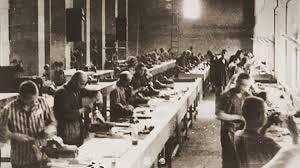OK … sigh … I just have to come right out and say it. Sometimes, super-religious people freak me out!
If you’ve been following my current posts, I hope you’ll have picked up on my current emphasis – finding stories about people who are motivated by love of their fellow humans, by forms of faith, and inspirational behaviour that we can all learn from.
You know – like the stories Jesus told – about the Good Samaritan for example – a tale which would have potentially offended many, because the Jews hated Samaritans, as they were ‘other’, and considered ‘unclean.’
Some of the stories I am currently telling, could teach ‘Christ-followers’ a few valuable lessons – should they care to capture the essence of the stuff I am relating.
I got some great responses from a story I put up mid-week about John Rabe – who was technically a Nazi diplomat stationed in Nanjing when the Japanese invaded China in the 1930’s.
I related how Rabe and some other Westerners, including missionaries who’d stayed behind when the Nanjing massacre began, managed – at the risk of their own lives - to save around 300,000 Chinese people from being slaughtered by the Japanese.
My story concluded with a passage from the Bible about how much value Jesus places on those who visit the prisoners, clothe the naked, feed the hungry and welcome the stranger.
That observation earned me a stern ‘telling off’ - from an irate woman, saying essentially, human goodness is irrelevant, unless you tick ALL the right biblical boxes. She cited some obscure Old Testament passage about God regarding acts of goodness as ‘dung and filthy rags’ [actually directed at hypocritical religious behaviour] – in a classic case of missing the point.
Sometimes I just despair, and I wonder, like R.E.M. puts it – if I might be “in the spotlight, losing my religion.”
I was not at all deterred by the barbed response I got to this week’s post.
But it did lead me down a thought track. Pondering on the zealous missile hurled at me, I reflected on how many of the people I hang out with these days, have tried really hard for most of their teen and adult lives to take part in, and have contributed fully to, places of organised religion, but who now no longer attend church - although with most still holding strong ‘faith viewpoints’, and doing great work in their communities.
Sometimes, these friends tell me, they just got tired of being boxed around the ears by people who are ‘scripture-quoting machines’ – individuals without the capacity to think beyond a one-dimensional, King James Bible version of the world.
Critics - who imply they are the ‘faithful ones’ in God’s eyes - the sort of ‘believer’ who can quote you a verse for every situation. Sadly, life and all its complexities is not like that - and a ‘paint by numbers’ approach to the heart of God can produce a deeply flawed result.
It just makes me want to work harder - to find and tell more great tales about how there are many brave souls who - even if we don’t have a clue what they actually believe in any religious sense - actually do model what the Nazarene Carpenter taught – in other words, what they do speaks louder than what the strict biblical literalists deliver by way of lectures.
On my heart this week has been a story about the crew of an American World War Two B-17 bomber.
One night, in the middle of the war, having dropped its bomb load on a German industrial complex, the bomber – with its crew of very young men – turned for home, an air base in English countryside. As the B-17 droned through Europe’s black night, two things happened almost at once.
The probing, bright fingers of Nazi searchlights reached into the sky ahead of the plane and then, powerful anti-aircraft batteries opened up - sending a barrage of shells towards the homebound squadron.
Like mini meteors the shells were exploding ahead of the bomber. The young crew members felt the familiar, sickening apprehension spread through the plane like a clammy mist. The ‘kill-rate’ on nights like this, often saw less than half the squadron make it back to base. There was no way of avoiding the barrage – it was too intense and widespread.
Each crew member clenched his teeth, and tensed up, awaiting what seemed like an inevitable fate.
Suddenly the first thud rocked the plane – a shell from the guns below had hit the fuselage. Quick prayers and a bracing for the explosion. Then, more thuds in the wings and body of the bomber, but at the same time – within seconds – an awesome realisation.
The thuds kept coming, the plane trembling with each impact, but as yet – no explosions. After what seemed an eternity, the bomber flew past the barrage of anti-aircraft fire – each man’s eyes bulging, mouths hanging open – a mixture of expectation and mad delight. It seemed their plane had been badly hit, several times, but somehow they were still flying.
The B-17, with gaping holes in many places made it back to its English base. Mechanics and support crew swarmed all over the aircraft as they crew babbled their tale of seemingly miraculous deliverance. With moments, an engineer emerged from under the belly of the plane with an unexploded shell he had pried from one of the fuel tanks.
It turned out to be one of about a dozen. The shells were carefully dismantled and amazingly contained no explosive charge: all empty - except for one in which they found a carefully wrapped piece of paper. It was written hastily in pencil in the Czech language. The note said simply, “THIS IS ALL WE CAN DO FOR YOU NOW”.
What dawned on the American airmen that morning was awesome. Somewhere in a Nazi munitions factory, Czech slave labourers, who knew full well the awful penalties for sabotage, had taken a huge risk. In an effort to help the Allies win the war, they had made non-exploding shells and then had the breathtaking courage to let someone know how the redemption of one American bomber crew had been accomplished. In love.
Anyone care to pick this story apart with some kind of microscopic ‘biblical lens’ and make an argument that the goodness of the brave slave labourers was irrelevant unless they were ‘truly Christian’ and therefore ‘saved’?
As for me, I rejoice in Christ-like behaviour wherever I discover it!
Grace and Peace










Love your stories Rob. It stirs my heart to see people as God's see's them. Samuel 16:7 for the Lord see's not as man sees. Man looks on the outward appearance but the Lord looks at the heart. . X
Spot on Rob. As Bishop Victoria, formerly of Chch said "poor theology". Thanks fir challenging poor theology and offering sound theology.